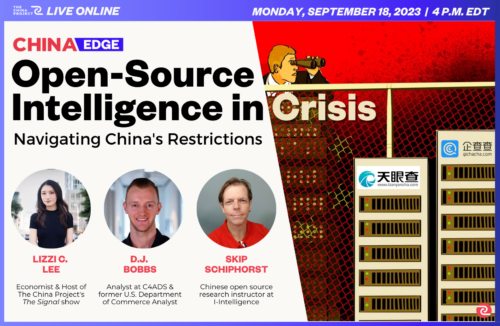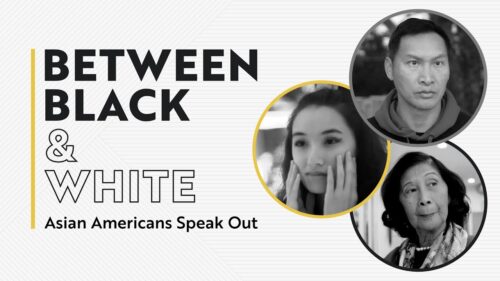Xi Jinping’s search for legitimacy: Decode Beijing’s law-and-order strategy | The Signal with Lizzi Lee
Taisu Zhang is a professor of law at Yale University, known for his recent work on the expansion of the Chinese administrative state down to the subdistrict and neighborhood level along with Beijing's shift from “performance legitimacy” as the foundation of political rule, and more toward legality.

Below is a transcript of the video:
Lizzi Lee: Hello and welcome to this Live with Lizzi Lee episode powered by The China Project. I’m your host, Lizzi. Joining me today is Professor Taisu Zhang from Yale Law School. Thank you so much for joining me.
Taisu Zhang: Well, thank you. Glad to be here.
Lizzi: So, Professor Zhang, in a recent foreign affairs essay, you argue that China’s rulers can no longer safely rely on economic performance as their primary source of political legitimacy. So what are the alternatives to economic performance?
Taisu: Well, so right now, I’m not sure there is a complete, fully reliable alternative. So the couple of alternatives that the Chinese government has been experimenting with and none of these have yet been proven to be fully adequate, but they’ve been experimenting with perhaps moderate levels of success, are basically some other version of what you would call performance based legitimacy. If you can’t reliably get economic growth, maybe you try to boost social equality and welfare. Alternatively, you could sometimes invest in environmental issues and so on.
The problem with those things is that to a large extent, your ability to make those kinds of investments depends on your performance. So if you don’t have the relatively high levels of fiscal income that economic growth provides, investing in welfare programs, investing in anti-poverty initiatives, or even investing in environmental changes, they are not necessarily going to be that cost-effective because it’s going to be hard to scale up when your fiscal circumstances are not strong. So the second thing they’ve tried to do basically is to play into the Chinese nationalist narrative. This takes a couple of forms. So there is more aggressive foreign policy making, which everyone outside of China has noticed.
Well, there’s a general narrative of industrial strength, technological innovation, and so on. But again, there the problem is that this is not so functionally separate from an economic performance per se, because unlike some other forms of nationalism, the kinds that you see, for example, in India or perhaps that you see in Western Europe or even in the US, the current version of Chinese nationalism is unusually closely aligned with economic performance. It’s not rooted in some sense of cultural uniqueness. It’s not necessarily rooted in a value system-based narrative. It’s a narrative of military strength, material strength, and international power, which means that, in times of plenty, you have this narrative built on top of good performance. When economic performance is slowed down, when perhaps even as might have happened over parts of past years when it turns negative, then this is not much of an adequate substitute because nationalist sentiment weakens pretty sharply of this kind of nationalism, of this kind, because very sharply, once it loses its material foundation. So the problem with the economic welfare risk, environmentalist, or nationalist narrative is that within their core logic, they’re not so separable from the raw economic performance itself. So they can’t substitute for that in terms of politics when economic performance slows down.
The third thing that’s instrumental in what is basically what Xi has been calling Yi-Fa-Zhi-Guo, ruling the country according to law, which has been a major initiative since 2013, 2014. And there, the idea is that, well, we can make the government more legalist, right? We can make the government run more according to written laws and make it more professionalized, formalistic, and predictable. All of this has long-term benefits, but that’s not the point. What’s important is it gives state behavior a certain kind of legal veneer and aura of legality that it otherwise wouldn’t have. The underlying clinical rationale behind this is that that in and of itself can be a source of legitimacy when all else fails.
Lizzi: Fascinating. You were careful to point out that legality is not the same as the rule of law, but is legality a substitute for the rule of law in some sense, or is it still not?
Taisu: So legality, as I said, it’s not the rule of law. The rule of law is more a political concept and a legalistic one. It’s more about basically whether any major actor in the political system is checked in a substantive way by some kind of legal role. Now, in the case of China, there are certain power-wielding entities, most notably the Central party leadership, that are not explicitly bound by Chinese law in any fashion. But the fact they’re not bound by law is not illegal. The law doesn’t reach this kind of authority. So it’s not a rule of law system in the traditional Western definition. That doesn’t mean it’s not legalist. Now, your question is, can legality substitute for the rule of law? It can’t. You know, the two things are functionally different. No amount of legality under the legal terms as provided for in Chinese law right now provides a meaningful check on the party leadership’s power. That’s the way that things are designed to be. So because of all that, they can’t substitute, but in public opinion, whether you can provide just as powerful a boost to the party’s perceived legitimacy is the question. And there, I think the signs are somewhat positive. So one thing that I’ve been doing in terms of research over the past couple of years is running these experiments with a couple of coauthors, political scientists at Stanford on whether you can have a positive social reaction in the Chinese context to investment in legality comparable with anything that you would actually call rule of law.
And we found that the results of this might not be true for many countries. People have argued that it’s not true, for example, in the U.S. or Western Europe, where the rule of law matters much more than legality. We have not found that to be the case in China. We have found that when all you need to do is enforce written rules and make sure people who are subject to the rules follow the rules, as long as you do that, you get a boost. The more you do that, the bigger the boost.
Now, even if that means that the elite, a considerable chunk of the highest policymakers, are unchecked in power, you still get a boost. So the core message, I think, is that the legitimacy-enhancing effects of legality are not dependent on having the rule of law. You can have them without actually providing the rule of law.
Lizzi: Fascinating. Just to be concrete. Can you give us some examples of how Xi Jinping and his lieutenants are, you know, relying on the legality or relying on the law to solidify their legitimacy?
Taisu Zhang: Over the past eight years, nine years, they’ve made many investments in boosting the overall stature of the courts vs. the other organs of China’s government.
So courts used to be pretty much like the ugly stepchild in the Chinese system. They were poorly paid and perhaps lower in status, as were fiscally beholden to parallel levels of governments. And so they had nothing that we would describe as functional independence.
Since 2014, the central government has begun to make considerable investments to boost dividends. So the idea is they want local courts to be able to act as some substantive check on the power of local governments. So not only have they made courts more fiscal dependent, they’ve boosted the salaries and stature of judges. They’ve also given them more power over administrative actions, most notably land takings.
So now everyone knows this is a major revenue stream for Chinese local governments. Since 2014, the local courts have gained major rule powers over land-taking activities by parallel governments.
And so that makes them considerably powerful players at the local level. It gives them a certain kind of legalistic check on the activities of local officials. So I think, in the end, what this tells us is that legality for the party leadership is certainly not a check on its power – they would never make that kind of investment. But it’s a way to make sure everyone else pretty much follows the orders. And by following orders, they probably think of law as a source of order. Perhaps even more importantly, it’s a source of order against lower-level officials down to the ministry level.






